Trending
Ecologically Balanced World is a Shared Responsibility

“Sustainable and ecologically balanced world is a shared responsibility,” Amadou Diallo, CEO – MEA, DHL Global Forwarding, firmly points out as the most pressing need of the hour. The statement underpins the vision defined for The Integrator’s August issue.
Notably, it is a collective success of modern thinking and universal acknowledgment, based on the “UN Paris Accord (2015),” that we got over 190 countries to agree on the framework to battle against global climate change and increasing emissions. Gulf Corporation Council (GCC) countries are enthusiastically committed to science-based target initiatives and strive to succeed with good results. Arthur D. Little’s recent report highlights GCC’s top performance across telecom, logistics, real estate, and financial industries in conducting sustainable initiatives and reducing carbon footprint.
Construction & architecture, energy & natural resources, packaging & consumer goods, and industrial manufacturing are highly responsible industries for sustainability. Focusing on ecological balance, each of their efforts creates a big impact.
In addition to a cover story on “sustainable logistics,” The Integrator brings in several perspectives from construction, financials, and IT on the subject. Check it out here: https://issuu.com/varmea/docs/the_integrator_-_august_2022
We are happy to announce the launch of the “LEADER” segment that features high-profile personalities on the magazine’s cover with an exclusive interview on the inside pages. The publication is open to influential figures across the diverse arena of IT, ICT, BFSI, logistics, and hospitality industries.
Similarly, the ICT Champion Awards 2022, our prestigious awards event, is scheduled to conduct on October 10, 2022 – on the sidelines of GITEX. It will recognize MEA’s leading ICT Vendors, Distributors, Resellers, and eminent personalities in 30+ categories and we seek your full support to make it a huge success!
Subscribe to us on LinkedIn.
Read, engage, and motivate!
Thank you!
Murali Margassery
Assistant Editor
Tech Interviews
From Diaspora Intelligence to AI: Unilever International’s Data Revolution
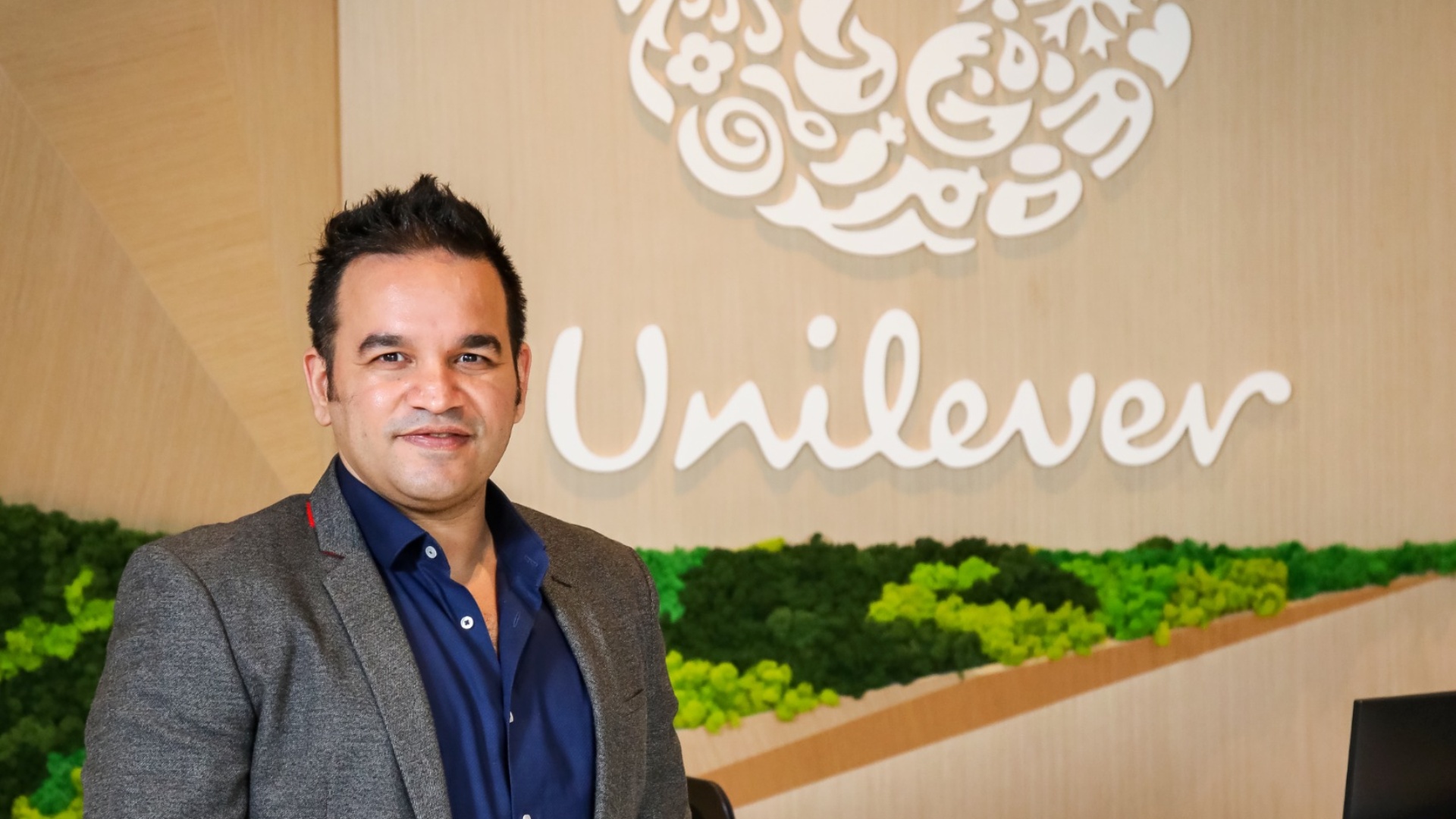
Exclusive Interview with Aseem Puri, CEO, Unilever International
- How is Unilever International using data and analytics to bring underserved and overlooked consumer groups into the center of your decision-making?
Many of the consumers we serve are invisible to conventional market structures, which are usually built around large, well-measured countries and mainstream shoppers. At Unilever International, we have turned that around by defining “underserved consumers” as our starting point: immigrants, global aspirers, and consumers in SMILE (small, island, landlocked, extreme) markets, who are often overlooked by traditional business models – and our business approach is specifically designed around these consumers.
Data analytics is central to our operations. We pull information from SAP, Salesforce and other operational systems into a single digital backbone, so shipment flows, customer orders, distributor stock and sales performance are visible in one real-time view across business functions. Alongside this, we use digital and social listening tools to understand what specific communities are searching for, watching and discussing, and we route those insights directly into innovation, portfolio and media decisions.
That is how we picked up emerging home-care rituals in Korea which inspired the Snuggle room spray and indoor dry range, now accounting for roughly 10% of the country’s fabric softener market. The same logic applies to partnerships: our role in building the ICC women’s cricket platform for brands such as Rexona and Dove was based on data on women’s sports viewership, participation and fandom, particularly in markets like India and the UAE. In this way, our investments are tied to real participation for girls and women and to growth in whitespace markets, not just to media reach.
- Diaspora consumers behave like distinct micro-markets with their own preferences. How are you using predictive modeling to anticipate their needs before they emerge?
For Unilever International, diaspora consumers are not a marginal audience; they are one of our largest growth engines. We serve more than 500 million diasporas across 40 SMILE markets, with a strong presence in the Gulf. We treat each major diaspora as a micro-market, with its own set of preferred brands, formats and seasonal or festive peaks.
Our predictive models combine migration trends, remittance flows where these are available, historic consumption patterns, and digital search and social signals to forecast how, when and where demand is likely to appear. As a result, we do not wait for an out-of-stock alert before acting.
For brands such as Bru, Lady’s Choice and Rafhan, we use forward-looking algorithms to shape assortment and route-to-market for South Asian and Middle Eastern communities in hubs such as the UAE, the UK and Australia.
From the shopper’s perspective, the benefit is simple. When they arrive in Dubai or London, the brands and pack sizes they recognise from home are already available in store or online, such as Ramadan, Diwali or Eid, because our models have anticipated those peaks rather than reacting after the seasons.
- Digital integration and data sharing are becoming standard across retailers and e-commerce platforms. How have these partnerships evolved for Unilever International in the UAE?
In the UAE, we have purposefully moved our relationships with retailers and e-commerce platforms away from purely transactional interactions towards shared value creation. By integrating sell-in and sell-out data feeds into our digital systems, we can see, almost in real time, how diaspora and expatriate shoppers are buying across modern trade and online channels.
This shared visibility allows us to co-create category strategies with key partners. Together, we tailor shelf layouts for Indian, Filipino or African shoppers in specific catchment areas, align promotional calendars to their festive occasions, and optimise e-commerce cut-off times so that late-night orders can still arrive the following day. Data sharing help both parties to reduce waste, avoid duplicated inventory and execute innovations with much shorter and more reliable launch windows.
Our role in brokering platforms such as ICC women’s cricket, announced at a festival in Dubai, also gives our customers access to high-energy brand properties. We then activate these jointly across stores, e-commerce and social channels in the Gulf. This creates a closed loop between data, media and execution that is grounded in the lived experience of UAE consumers, rather than driven solely by internal planning cycles.
- AI adoption is accelerating across supply chains and consumer insights. How is Unilever International using AI to create real value for underserved consumers while enabling faster, smarter growth?
We see AI as a strategic teammate that extends the capability of our people rather than replacing them. Our AI Hub in Singapore co-ordinates how tools are deployed across demand sensing, supply chain and marketing, and human resources. We are moving from isolated experiments to integrated systems that connect marketing, supply chain, finance and resourcing data so that decisions can be made jointly and in real time.
For underserved consumers, the impact is very tangible. AI-driven demand sensing and container optimisation help us keep shelves stocked and navigate complex routes without relying on a single corridor, even when there are disruptions such as the Red Sea crisis. AI-powered social listening highlights niche behaviours, for example Koreans using fabric fresheners as room sprays or searching for indoor drying solutions. These insights led to new Snuggle formats tailored to local needs, which gained share quickly.
We also have a documentation centre of excellence to manage end-to-end paperwork for new and existing product entries. We have partnered with a tech startup to develop an AI-optical character reading programme that supports import and export processes, and optimises container loads with 100% accuracy.
All AI activity is guided by Unilever’s Responsible AI Policy, which requires transparency, human oversight and the ability to challenge decisions in every use case. This balance between speed and responsibility allows us to unlock growth without compromising trust.
- In many emerging markets, data is often limited or incomplete. How do you build a reliable, tech-enabled decision-making system in these environments to ensure accuracy and speed?
Many of the countries we serve, including small islands, landlocked states and conflict-affected territories, do not generate the rich, structured data sets that larger markets enjoy. Instead of waiting for perfect information, Unilever International has built a “good enough to act” decision system that deliberately combines different sources of insight.
We integrate shipment data from our SAP backbone, distributor sell-out data where it can be secured, digital shelf and pricing information, and social listening. We complement this with qualitative insight from local teams, NGOs and institutional partners. In SMILE markets such as rural Laos or East Timor, we overlay container-level visibility so that we can see precisely where goods are located, how long customs processes are taking and where real bottlenecks are forming.
AI-enabled tools help us to close the gaps. We use proxy indicators to forecast demand and plan scenarios to test potential price and promotion moves. Human judgement, particularly from local partners, remains central. Our digital backbone ensures that decisions are fast, repeatable and auditable, even in highly challenging environments.
- Leading a tech-driven organization requires both vision and adaptability. What personal leadership principle has shaped the way you guide Unilever International through digital transformation and fast-moving markets?
The principle that has influenced my leadership most is empathy combined with decisive action. Unilever International delivers products to nearly every country in the world, barring sanction markets, which means our teams work across a wide range of cultures, regulatory environments and infrastructure conditions. If I do not genuinely understand what motivates colleagues, customers and consumers on the ground, even the strongest digital strategy remains abstract.
At the same time, I believe in empowering our teams to experiment and fail forward. This mindset, supported by data and AI, allowed us, for example, to build a direct-to-consumer platform in 100 days and to scale collaborations such as the IHG bulk-amenities partnership, which removes hundreds of tonnes of single-use plastic annually while giving travellers an improved yet sustainable Dove experience.
We embed this way of working through our “digital identity” approach, where leaders explicitly carry digital responsibilities within their titles and objectives. This makes it clear that technology, AI and data are not the concern of a separate specialist team. They are part of how every leader at Unilever International serves underserved consumers and grows the business with both speed and responsibility.
Trending
Xiaomi Unveils REDMI Note 15 Series and Expands AIoT Ecosystem with New Smart Devices

Xiaomi has officially launched the REDMI Note 15 Series in the UAE, featuring five new models: REDMI Note 15 Pro+ 5G, Pro 5G, Pro, and the REDMI Note 15 5G and 4G variants.
The series debuts REDMI Titan Durability, integrating reinforced frames and Corning Gorilla Glass Victus 2 for superior drop and crush resistance. The Pro models boast massive Silicon–Carbon batteries (up to 6,580mAh) with 100W HyperCharge, designed to maintain peak health for over six years.
Photography enthusiasts can leverage a flagship 200MP main camera on Pro models, featuring AI-powered 4× lossless zoom and Xiaomi HyperAI editing tools. Performance is driven by the Snapdragon 7s Gen 4 and Xiaomi IceLoop cooling, while the 120Hz AMOLED displays offer a stunning 3,200 nits peak brightness.
Connectivity reaches new heights with Xiaomi Offline Communication, allowing kilometer-level voice calls without network coverage. Xiaomi also expanded its AIoT ecosystem, introducing the REDMI Buds 8 Lite, Xiaomi Electric Scooter 6 Series, and Smart Audio Glasses.
The REDMI Note 15 Series combines ultimate resilience with cutting-edge AI, setting a new benchmark for smartphone value in the region.
Redmi Note 15 Series Partners with Discovery Channel to Demonstrate Real-World Endurance
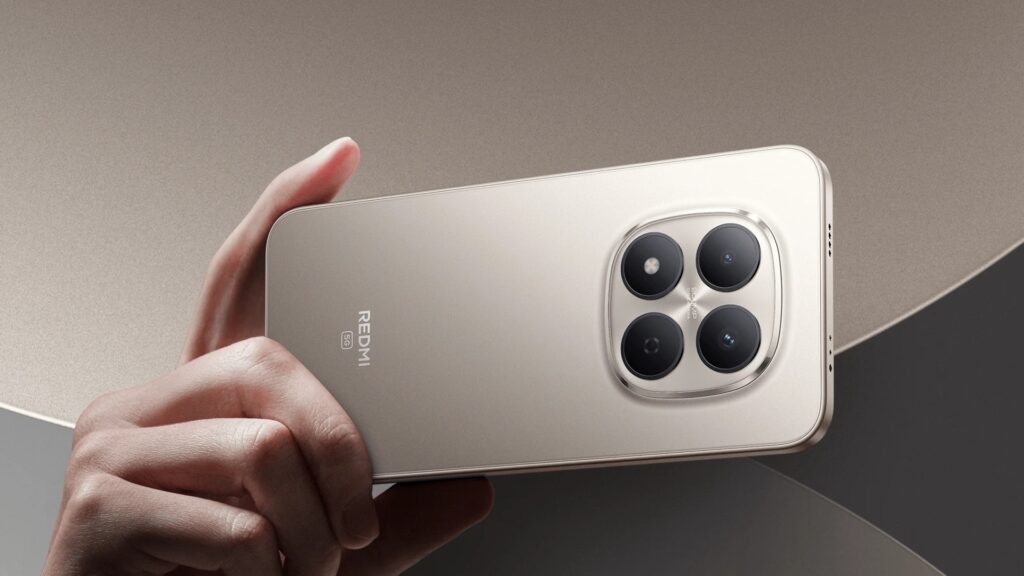
To showcase the Redmi Note 15 Series “diamond-grade durability,” Xiaomi has partnered with Discovery Channel on a co-branded campaign featuring explorer and survival expert Ed Stafford, renowned for his extreme outdoor challenges. In the campaign, Ed takes on a continuous 24-hour endurance challenge, using the Redmi Note 15 as his only essential tool.
The film demonstrates the phone’s real-world capabilities: supporting navigation, lighting, photography, compass and weather checks, and connectivity, while highlighting its durability, water resistance, and long-lasting battery life.
The campaign will be amplified across Discovery Channel’s platforms and supported by official press coverage, bringing the “tech + endurance” story to audiences across the UAE. To further engage media and creators, a limited number of “Titan Durability” co-branded gift boxes will be made available for unboxings and challenge-style content, offering a hands-on experience of the series’ resilience.
Mijia Smart Audio Glasses: Style Meets Technology

The UAE launch also introduces Mijia Smart Audio Glasses, blending open-ear audio with elegant eyewear design. Equipped with four microphones, wind noise reduction, and a privacy mode, the glasses allow UAE users to enjoy music and calls while staying aware of surroundings. Lightweight and durable, they feature IP54 splash and dust resistance, UV and blue light protection, and up to 13 hours of playback, with fast charging offering 4 hours from just 10 minutes. The Xiaomi Glasses app allows full control, including gesture customization, dual-device connectivity, and safe recording options.
REDMI Buds 8 Lite
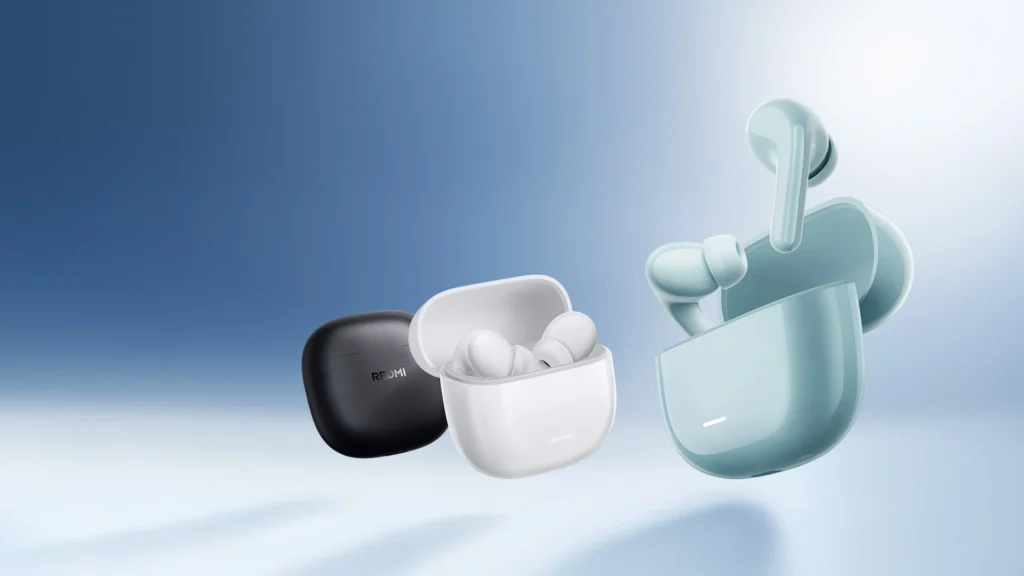
Also joining Xiaomi’s AIoT portfolio are REDMI Buds 8 Lite, entry-level true wireless earbuds designed for everyday practicality and convenience. Available in Black, White, or Blue, they feature a 12.4mm titanium-diaphragm driver for clear, detailed sound, Bluetooth 5.4 connectivity, and hybrid active noise cancellation up to 42dB with Transparency mode. Dual-mic AI environmental noise cancellation ensures clear calls even outdoors, while five pre-set EQ modes and app-based customization let users tailor their audio experience. With dual-device connectivity, fast charging, and up to 36 hours of total battery life with the case, REDMI Buds 8 Lite deliver a versatile, practical audio solution for daily use.
Xiaomi TV S Pro Mini LED Series

Xiaomi also introduces the Xiaomi TV S Pro Mini LED Series in UAE, offering 75″, 65″, and 55″ QD-Mini LED models with 4K UHD resolution, 1700 nits peak brightness, Dolby Vision®, HDR10+, HLG, and Filmmaker Mode. With 144Hz native refresh rate, Mini LED local dimming, and low-reflection display technology, the series provides ultra-smooth visuals and vibrant, accurate color reproduction. Audio is powered by dual 15W speakers, Dolby Atmos, Harman AudioEFX, and Xiaomi Sound tuning, delivering immersive experiences for movies, gaming, and streaming. Connectivity options include Wi-Fi 6, Bluetooth 5.2, HDMI 2.1, USB, Ethernet, and built-in Google TV, Google Cast, and Apple AirPlay, offering seamless streaming and device integration.
Automotive
New Ford Taurus Arrives to Middle East, Bringing Best-in-Class Technology and Driving Experience to Sedan Customers
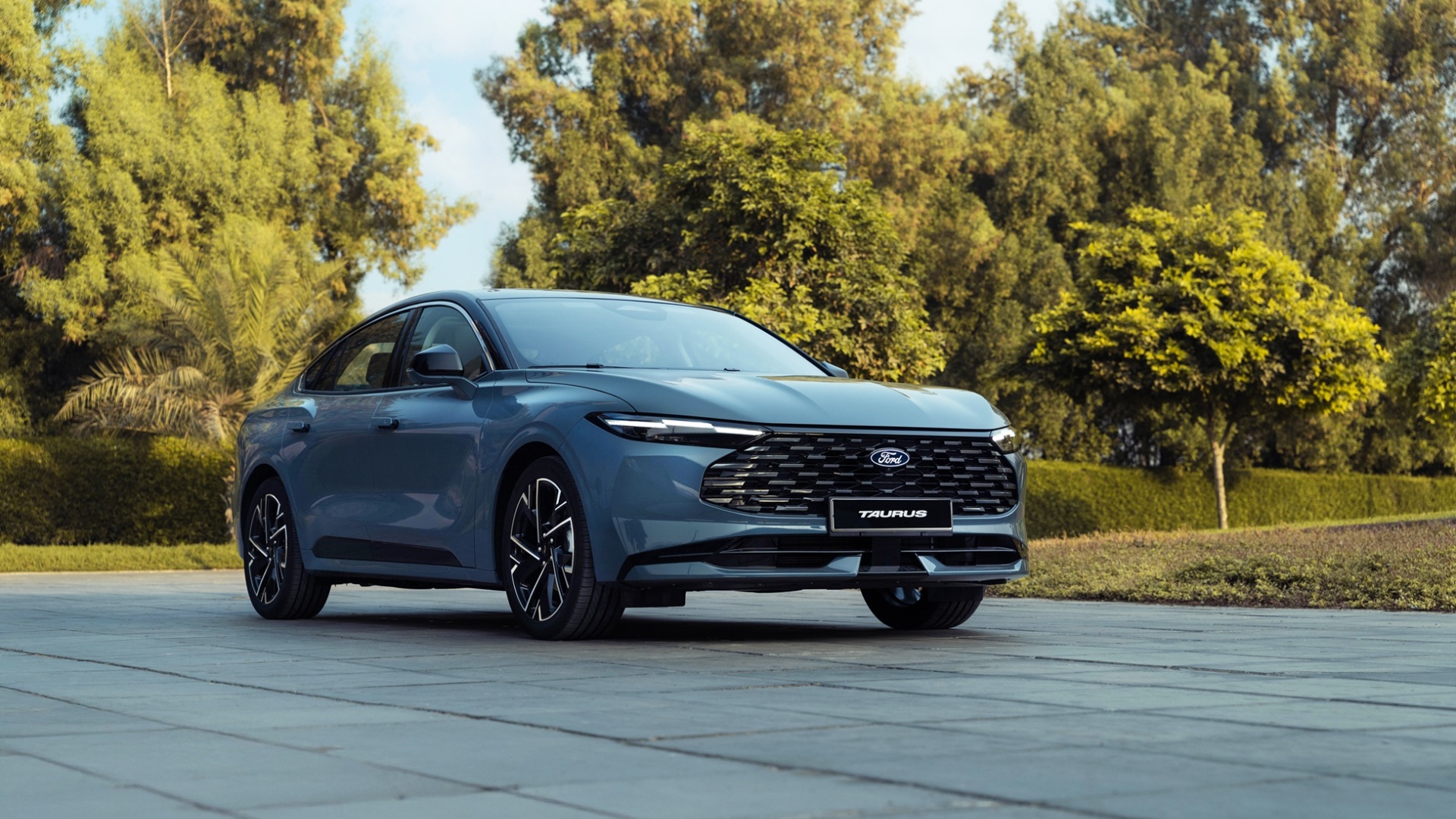
Ford Middle East and North Africa has marked the official arrival of the new Taurus in the Middle East. Building on its storied legacy, this latest iteration introduces sophisticated design, cutting-edge features, and a blend of premium comfort and dynamic performance tailored for the diverse needs of the region.
Commanding attention with a completely refreshed aesthetic, with its exterior boasting a bold new front and rear fascia, updated headlamp architecture, and distinctive new wheel designs, while new vibrant colors like Hot Pepper Red and Vapor Blue ensured Taurus makes an undeniable visual statement. The interior, too, receives significant enhancements with new color and material choices, refined seat trims, and a modified console designed for heightened comfort and contemporary style.
Ravi Ravichandran, President of Ford Middle East and North Africa, said: “The new Ford Taurus represents a pivotal evolution for one of Ford’s most successful nameplates, designed specifically with our loyal Middle East and North African customers in mind. This sedan combines a rich heritage with forward-thinking innovation, making it perfectly timed for customers seeking a vehicle that blends prestige, practicality, and advanced technology.”
The newest Taurus is engineered to lead, offering a choice of powerful and efficient powertrains. Under the hood, the robust 2.0L EcoBoost engine, paired with an 8-speed automatic transmission, continues to deliver commendable performance, producing an impressive 239 horsepower and 382 Nm of torque. For those prioritizing even greater fuel efficiency, the 1.5L Hybrid engine offers an enhanced drive without compromising on power. The result is a pair of powertrains that meet diverse driving preferences while delivering a smooth and responsive experience across city streets and open highways.
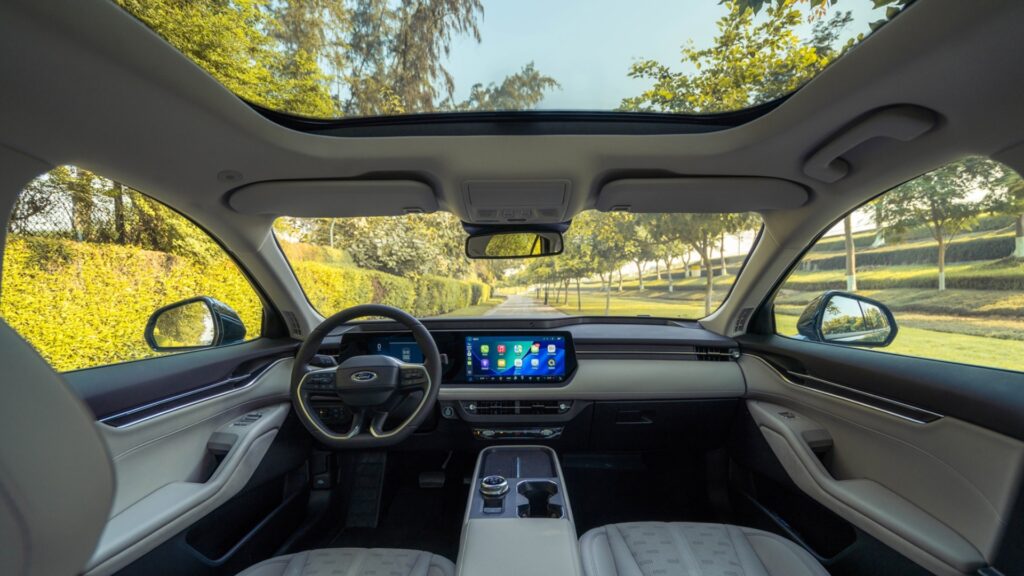
At the heart of the new Taurus’ comprehensive technology upgrades is Ford’s latest-generation SYNC 4A infotainment system, presented on an impressive 13.2-inch full HD center touchscreen—one of the biggest in its class. This intuitive system offers seamless connectivity with wireless Apple CarPlay and Android Auto as standard.
New features that further redefine Ford’s flagship sedan’s convenience and luxury include a 360-degree camera, now available from the base Ambiente model, and a premium 10-speaker B&O Sound System integrated into the top-tier Titanium series for an immersive audio experience.
Building on its reputation for spaciousness, the new Taurus also caters effectively to families, providing ample cargo space and roomy interiors for both daily commutes and long journeys. Additionally, ventilated seats, available from the Trend trim, guarantees optimal comfort in any climate, while the available dual-panel panoramic sunroof enhances the cabin’s sense of openness and luxury.
Equipped with a comprehensive suite of driver-assistance technologies designed to enhance safety and ease of driving—where features such as Intelligent Adaptive Cruise Control; Pre-Collision Assist with Automatic Emergency Braking; and the Lane-Keeping System with Blind Spot Monitoring and Cross-Traffic Alert, Taurus is peace of mind in motion. The 360-degree camera supplements it further by providing a comprehensive view for easier maneuvering and parking, backed up by Intersection Pre-collision Assist, and Emergency Steering Assist for extra support to help avoid incidents.
Taurus is also ushering in a new era of connected vehicle experiences, with the Ford Pass app available in select Middle East markets, offering added convenience, control, and peace of mind. New Ford Taurus owners can now remotely start their vehicle, pre-condition the cabin to their preferred temperature, and even activate the horn and lights to easily locate their car in a crowded parking lot. The all-new app also provides essential vehicle status updates, allowing users to monitor vital information such as fuel levels, odometer readings, tire pressure, and oil, placing a host of functionalities directly into the customer’s hands.
The arrival of the New Ford Taurus is a strategic move that reinforces Ford’s commitment to providing a diverse portfolio of vehicles that resonate with regional customers, from tried and trusted EcoBoost-powered engines to New Energy hybrids complementing the Middle East region’s ambitious sustainability goals.
With its blend of everyday usability, value for money, and strong dealer support, the new Ford Taurus—in showrooms now—is crafted to strengthen its leadership in the segment and continue its legacy across the Middle East and North Africa.
-

 Tech News2 years ago
Tech News2 years agoDenodo Bolsters Executive Team by Hiring Christophe Culine as its Chief Revenue Officer
-

 VAR10 months ago
VAR10 months agoMicrosoft Launches New Surface Copilot+ PCs for Business
-
News10 years ago
SENDQUICK (TALARIAX) INTRODUCES SQOOPE – THE BREAKTHROUGH IN MOBILE MESSAGING
-

 Tech Interviews2 years ago
Tech Interviews2 years agoNavigating the Cybersecurity Landscape in Hybrid Work Environments
-

 Tech News7 months ago
Tech News7 months agoNothing Launches flagship Nothing Phone (3) and Headphone (1) in theme with the Iconic Museum of the Future in Dubai
-

 VAR1 year ago
VAR1 year agoSamsung Galaxy Z Fold6 vs Google Pixel 9 Pro Fold: Clash Of The Folding Phenoms
-

 Tech News2 years ago
Tech News2 years agoBrighton College Abu Dhabi and Brighton College Al Ain Donate 954 IT Devices in Support of ‘Donate Your Own Device’ Campaign
-

 Automotive1 year ago
Automotive1 year agoAGMC Launches the RIDDARA RD6 High Performance Fully Electric 4×4 Pickup















